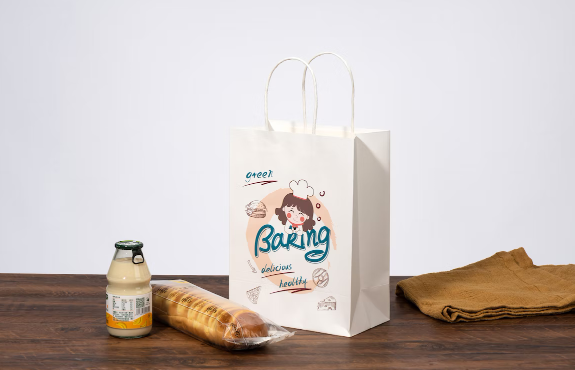In today’s blog, we are going to show the following points:
Introduction
Section 1: Benefits of paper packaging bags
Section 2: Types of paper packaging bags
Section 3: Applications of paper packaging bags
Section 4: Production of paper packaging bags
Section 5: Disposal and recycling of paper packaging bags
Conclusion

Introduction Of Paper packaging bags
Paper packaging bags refer to bags made entirely or partially from paper materials used for packaging various goods, including food, clothing, gifts, and many other products.
These bags are usually made of paperboard, kraft paper, or other types of paper materials, which are biodegradable, recyclable, and eco-friendly.
Paper packaging bags are a popular choice for businesses and consumers who are environmentally conscious, as they are a more sustainable alternative to plastic bags. Additionally, they can be customized with various designs, logos, and colors, making them an attractive and versatile packaging option.
Importance of paper packaging bags
There are several important reasons why paper packaging bags are an essential packaging option:
Eco-Friendliness:
Paper packaging bags are a more environmentally friendly option compared to plastic bags.
Paper is a renewable resource and is biodegradable, meaning it can decompose naturally over time, making it an eco-friendly choice. Additionally, paper bags can be easily recycled, which helps to reduce the amount of waste sent to landfills and helps to conserve natural resources.
Customization:
Paper packaging bags can be customized to suit the specific needs of a business or product.
They can be printed with logos, designs, and colors, making them an attractive and versatile packaging option. Customization also helps to create a unique brand identity and increase brand recognition.
Durability:
Despite being made of paper, paper packaging bags are surprisingly durable and can withstand a significant amount of weight. This makes them an ideal option for carrying heavy items, such as groceries or books.
Cost-effectiveness:
Paper packaging bags are often more cost-effective than other types of packaging options, such as plastic bags. This makes them a popular choice for businesses looking to reduce packaging costs while maintaining the quality of their packaging.
Safety:
Paper packaging bags are safe for use with food products, as they are non-toxic and do not release harmful chemicals when in contact with food.
The use of paper packaging bags is an important step towards a more sustainable and eco-friendly future, while also providing businesses with a cost-effective and customizable packaging solution.

Section 1: Benefits of paper packaging bags
Health benefits of paper packaging bags
Environmental benefits of paper packaging bags
Economic benefits of paper packaging bags
Marketing benefits
Social benefits
Benefits of paper packaging bags:
Health benefits: Paper packaging bags are a safe and hygienic packaging option, especially for food products.
Unlike plastic, the paper does not release harmful chemicals when it comes into contact with food, making it a safer option for consumers.
Additionally, paper bags are breathable, which helps to prevent the growth of bacteria and mold, keeping the contents of the bag fresher for longer.
Environmental benefits
Paper packaging bags are a more environmentally friendly option than plastic bags.
They are made from renewable resources and are biodegradable, meaning they can decompose naturally without harming the environment.
Additionally, paper bags can be easily recycled, reducing the amount of waste that ends up in landfills and helping to conserve natural resources.
Economic benefits
Paper packaging bags are a cost-effective option for businesses. They are often less expensive than plastic bags and can be customized with logos, designs, and colors, helping to increase brand recognition and customer loyalty.
Additionally, paper bags are reusable and durable, making them a better long-term investment for businesses.
Marketing benefits
Paper packaging bags offer businesses a unique opportunity to market their products and services. They can be customized with logos, designs, and colors, helping to increase brand recognition and customer loyalty.
Additionally, paper bags are often used in public places, such as shopping centers and parks, providing free advertising for businesses.
Social benefits
The use of paper packaging bags can help to create jobs in the paper and packaging industries, which can benefit local economies.
Additionally, the use of paper bags can help to reduce litter and pollution, creating a cleaner and safer environment for communities.
Brief summary, the use of paper packaging bags offers a wide range of benefits, including health, environmental, economic, marketing, and social benefits.
As such, they are an excellent choice for businesses and consumers who want to make a positive impact on the environment and society.

Section 2: Types of paper packaging bags
How often are they being used separately?
There are several types of paper packaging bags that are commonly used for various purposes. The frequency of use for each type of bag may depend on factors such as the intended use, the industry, and the geographic location.
Here are some common types of paper packaging bags and their typical usage:
Brown paper bags:
These bags are commonly used in grocery stores, convenience stores, and other retail establishments for carrying items such as groceries, snacks, and small purchases.
They are also used in the food service industry for packaging sandwiches and other to-go items. Brown paper bags are typically made from recycled paper and are environmentally friendly.
White paper bags:
These bags are similar to brown paper bags, but they are made from bleached white paper.
They are commonly used in the retail industry for packaging high-end products, such as clothing, jewelry, and cosmetics.
White paper bags are also commonly used in the food service industry for packaging baked goods and other items.
Colored paper bags:
These bags are available in a wide range of colors and are commonly used in the retail industry for packaging gifts, clothing, and other items.
They are also popular for use in the food service industry, particularly for packaging candy and other sweets.
Printed paper bags:
These bags can be customized with logos, designs, and other branding elements. They are commonly used by businesses and organizations for promotional purposes, as well as in the retail industry for packaging products.
Handle paper bags:
These bags have handles that make them easier to carry.
They are commonly used in the retail industry for packaging clothing, shoes, and other items that may be too heavy or bulky to carry without a handle.
Handle paper bags are also commonly used in the food service industry for packaging take-out meals and other items.

The frequency of use for each type of paper packaging bag will vary depending on the specific industry and application.
However, paper bags are generally considered to be a popular and versatile packaging option due to their affordability, sustainability, and ease of customization.
Section 3: Applications of paper packaging bags
Grocery stores
Food industry
Retail industry
Gift wrapping industry
Industrial packaging
Paper packaging bags have a wide range of applications across various industries. Some of the most common applications of paper packaging bags include:
Grocery stores:
Paper bags are widely used in grocery stores for carrying fruits, vegetables, and other grocery items.
These bags are eco-friendly and can be easily recycled, making them a popular choice for consumers who are environmentally conscious.
Food industry:
The food industry uses paper packaging bags for packaging snacks, bakery items, fast food, and other food products.
Paper bags are a great option for food packaging as they are breathable, lightweight, and can maintain the freshness of food products.
Retail industry:
Paper bags are widely used in the retail industry for packaging clothes, shoes, and other retail items.
These bags are often branded with the store's logo, making them a great marketing tool for businesses.
Gift wrapping industry:
Paper bags are a popular choice for gift wrapping, especially for small and medium-sized gifts. They are available in various colors and designs, making them a versatile and attractive option for gift packaging.
Industrial packaging:
Paper bags are used for packaging various industrial products, such as chemicals, cement, and fertilizers.
These bags are designed to withstand heavy loads and rough handling, making them a durable and reliable option for industrial packaging.

Section 4: Production of paper packaging bags
Paper packaging bags are commonly used for various purposes, such as grocery bags, shopping bags, food packaging, and more.
The production of paper packaging bags involves the use of raw materials, including paper, adhesives, and ink.
The manufacturing process involves cutting, folding, and gluing the paper to form the desired bag shape.
Raw materials used in paper packaging bags
The primary raw material used in paper packaging bags is paper. The paper used for these bags can be made from a variety of sources, including recycled paper, pulp, and paperboard.
Recycled paper is an eco-friendly option that reduces waste and saves trees. Paperboard is a thicker and more durable option that can provide added strength and protection to the bag.
Adhesives and ink are also used in the manufacturing process.
The manufacturing process of paper packaging bags
The manufacturing process of paper packaging bags typically involves the following steps:
Paper selection: The paper is selected based on the desired bag size, strength, and durability.
Printing: The paper is printed with the desired design, logo, or text using eco-friendly ink.
Cutting: The paper is cut to the desired size and shape.
Folding: The paper is folded to form the desired bag shape.
Gluing: The paper is glued along the edges to hold the bag together.
Finishing: The bag is finished with handles or other accessories.
Sustainable production practices
To produce paper packaging bags sustainably, manufacturers can take several steps, including:
Using recycled paper:
Using recycled paper reduces the need for virgin materials and saves trees.
Using eco-friendly ink:
Eco-friendly ink is made from natural and renewable sources and does not contain harmful chemicals.
Using renewable energy:
Manufacturers can use renewable energy sources, such as solar or wind power, to reduce their carbon footprint.
Reducing waste:
Manufacturers can implement waste reduction practices, such as recycling and composting, to reduce waste and save resources.
Choosing sustainable suppliers:
Manufacturers can choose suppliers that use sustainable practices and materials to reduce their environmental impact.
Section 5: Disposal and recycling of paper packaging bags
Paper packaging bags can be disposed of and recycled in several ways.
One of the most common ways to dispose of paper packaging bags is to recycle them.
When paper packaging bags are recycled, they are processed into new paper products, reducing the need for virgin materials and saving energy.
If paper packaging bags are not recycled, they can be disposed of in landfills, where they will eventually break down over time.
Biodegradability of paper packaging bags
Paper packaging bags are biodegradable, meaning they can break down naturally over time when exposed to the right conditions, such as moisture and oxygen.
This makes them a more environmentally friendly option compared to non-biodegradable materials, such as plastic.
Recycling paper packaging bags
Recycling paper packaging bags is an important way to reduce waste and conserve resources.
Recycling paper packaging bags should be clean and free of any contaminants, such as food residue or grease.
Some recycling facilities may not accept paper packaging bags with handles or other accessories, so it's important to check with the facility first.
Composting paper packaging bags
Paper packaging bags can also be composted, which is a process that breaks down organic materials into nutrient-rich soil.
When composted, paper packaging bags provide a valuable source of carbon, which is essential for healthy compost.
It's important to note that composting paper packaging bags may require a longer time compared to other organic materials, as the bags are typically thicker and take longer to break down.
However, when composted properly, paper packaging bags can provide a sustainable and eco-friendly solution for disposing of organic waste.

Conclusion
In short, paper bags are an essential part of the packaging industry.
They are versatile, environmentally friendly, and can be recycled or composted at the end of their life cycle, thus reducing waste and saving resources.
As more and more companies and consumers become aware of the environmental impact of packaging materials, the future of paper bags in the packaging industry looks bright.
Demand for sustainable packaging options is rising, and paper bags are a viable solution that can meet these needs.
In addition, advances in technology have made it possible to produce paper-based bags with greater strength and durability, making them suitable for a wider range of applications.
UK-based packaging company ecopackers, a brand that promotes green packaging, continue to innovate and find new ways to create sustainable packaging solutions.
We believe that the future of paper packaging bags in the packaging industry is bright.